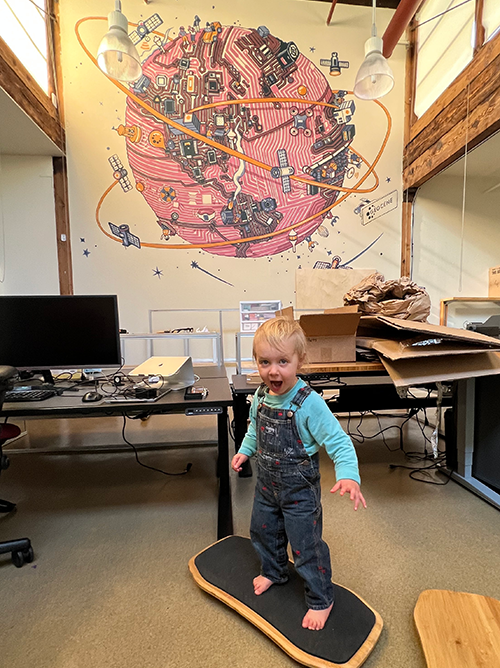The Update:Nigel’s mural and World Central Kitchen
Thanks for the time off to be with baby Rose!
- Nigel totally rocked that mural on the wall in the new office. Almost as much as my older daughter, June, is rocking that balance board in this photo from moving day. We love being back in Berkeley, Geocene’s birthplace.

The planet is a printed circuit board (PCB), and many of our past projects are featured on land, sea, and space. Thank you, Nigel Sussman, for the awesome mural. And thank you, June Wilson, for shredding the gnar.
- Geocene is wrapping up a multi-year project in Guatemala with World Central Kitchen, the food relief organization run by Chef José Andrés. Our Geocene Dots were installed as stove use monitors (SUMs). With Dots, World Central Kitchen tracked the adoption of cleaner LPG cooking stoves. LPG is similar to propane, and it is a much cleaner cooking fuel than traditional wood. For three years, World Central Kitchen ran an incredible study measuring the effects of training and other interventions on LPG stove adoption. Geocene then processed all of those millions of sensor data points and hundreds of thousands of survey questions into a forthcoming report that quantifies the extent to which LPG is adopted and wood is dis-adopted. Headline: It’s good news.

A Guatemalan cook with her improved LPG-burning cookstove.
- We work with a lot of integrated circuits (ICs). There are three categories of ICs for doing tasks and crunching data. The highest level are microcontrollers, general-purpose devices whose logic is usually written in C, C++, or (increasingly) Rust. Most of our work operates here. At the lowest level, custom application-specific integrated circuits (ASICs) run tightly defined and hard-coded logic—logic that is only changeable by changing the hardware itself. In the middle are FPGAs, ICs that are reprogrammable but run specialized code called Hardware Description Language (HDL) instead of a programming language like C. Intel ran a $16.7B “experiment” on building FPGAs and recently decided to spin off and IPO the unit. Maybe Intel will find a non-x86 business they love some day.
- Texas Instruments has some new ultra-cheap Arm Cortex-M0+ microcontrollers starting at $0.39. It looks like they are gunning for the $0.10 WCH with RISC-V architecture. TI is famous for providing fantastic documentation, examples, and support for EE schools, which helps teams get going fast. Lately we have been building most projects using ST, Nordic, Ambiq, and Microchip/AVR, but historically we have used more TI microcontrollers than any other brand.
